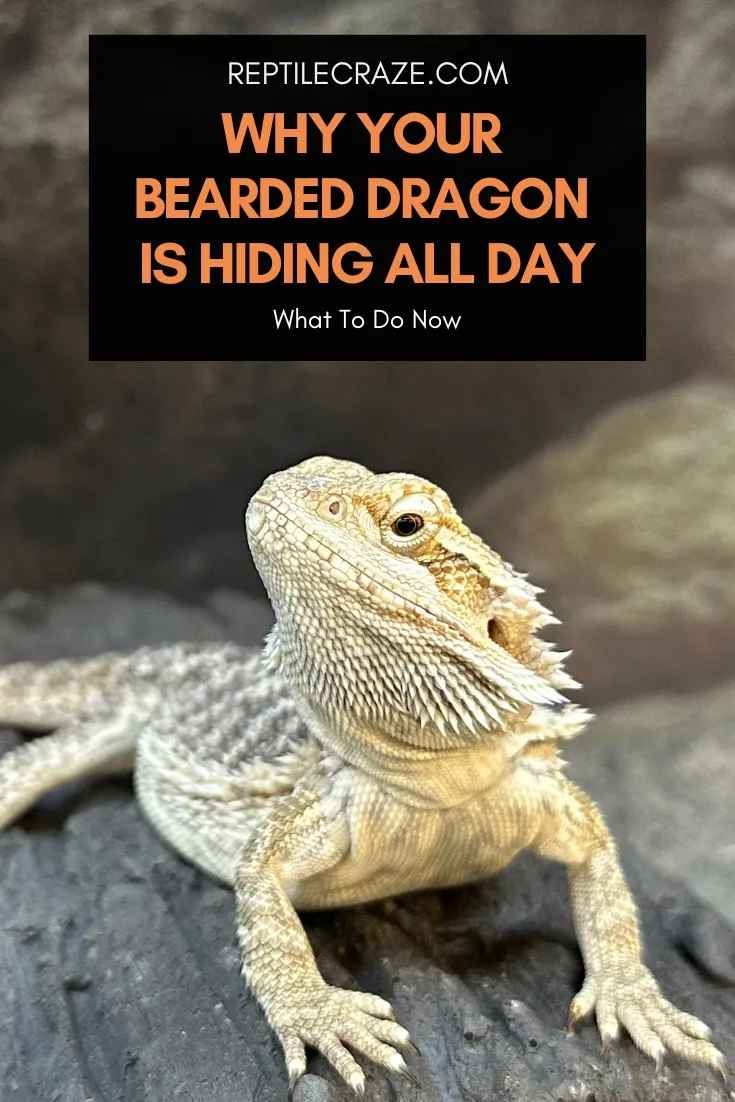
Does your Google search history contain the term ‘bearded dragon hiding all day?’ If yes, we can help. Bearded dragons are friendly with humans, so reptile owners can feel when their pet takes to isolation. If your bearded dragon is hiding, it could be a red flag to a bigger concern.
Bearded dragons generally hide due to health or behavioral concerns and ambient factors. For example, the most common culprits behind beardies hiding out are illness, shedding, stress, boredom, inadequate lighting or heat, and
If you’re worried about your pet reptile’s hiding habit, we can help. This article will cover the causes and solutions for bearded dragons hiding in detail. All you need to do is stick with us.
Table of Contents
Why Is My Bearded Dragon Always Hiding?
There can be several reasons behind your bearded dragon is hiding and not eating. Nonetheless, it’s essential to identify the root cause before you can work on a solution.
This section can help you do just that. There’s a handy table below for a quick rundown for readers short on time. For a more detailed analysis, keep scrolling.
| Reasons Your Bearded Dragon Is Hiding | ||
| Health Concerns | Behavioral Concerns | Ambient Factors |
| Digestive Problems | Stress | Tank Size |
| Respiratory Infections | Age | Inadequate Lighting |
| Parasites | Boredom | Heating Issues |
| Injury | Tank Mates | |
| Shedding | ||
| Brumation |
Health Concerns
Bearded reptiles are popular pets because they’re relatively easy to care for.
But, even so, they’re susceptible to certain health issues that reptile owners should be aware of because they’re a danger to your pet’s well-being and can cause beardies to grow aloof.
Here’s what some of them are.
Note: If your bearded dragon is hiding and appears to be sick, get it to a vet asap. If you don’t have an exotic vet near you, we recommend you book an online vet here!
1. Digestive Problems
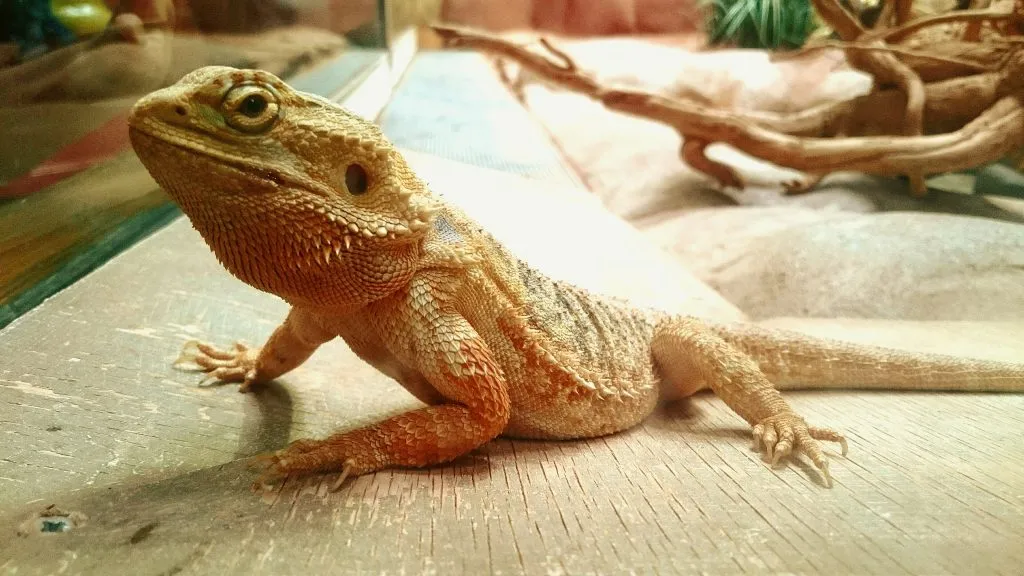
Believe it or not, impaction or constipation is a big concern for beardies. Moreover, bearded dragons can develop gastrointestinal impaction for several reasons.
One of the most prevalent reasons for constipation in Pogona vitticeps is
Another reason why beardies can face irregular elimination is flawed temperatures.
Since beardies are reptiles, they need heat from external sources to maintain body temperatures. Heat is also vital for these reptiles in terms of physiological functions. Too little heat means your lizard won’t be able to digest its
Finally, sand or gravel ingestion is the species’ third most common cause of constipation. If your reptile suffers from constipation, it’ll likely seek a cave or covering to hide as it’s vulnerable and weak.
Symptoms of impaction include trouble excreting, trembling legs, regurgitation, and not being able to walk properly.
Tip: If your bearded dragon isn’t pooping, our article here will help you!
2. Respiratory Infections
Bearded dragons can develop respiratory infections due to malnutrition, unhygienic surroundings, or lack of heat. Typically, fungi, viruses, bacteria, or parasites can all be potential causes of respiratory problems in the species.
Once your reptile is sick for any reason, its immune system takes a hit, making it unable to stop bacteria from infiltrating the respiratory tract.
Symptoms of respiratory problems include sneezing, eye or nose discharge, shallow breathing, and bubbles from the nose or mouth. Lethargy and inappetence are also strong indicators of disease.
Beardies with respiratory problems will seek a hiding spot to try and ride out the illness.
3. Parasites
Pogona vitticeps are susceptible to ectoparasites (parasites living on the host) and endoparasites (parasites living inside the host). These include pests like lizard and chigger mites in skin folds or external ears.
Juvenile beardies are especially vulnerable to the protozoan parasite coccidia (Isospora amphiboluri). Signs that your reptile is suffering from coccidiosis include diarrhea, lethargy, and anorexia.
Parasites, whether on or inside your pet’s body, can cause discomfort or stress, which is likely why your beardy prefers its own company.
4. Injury
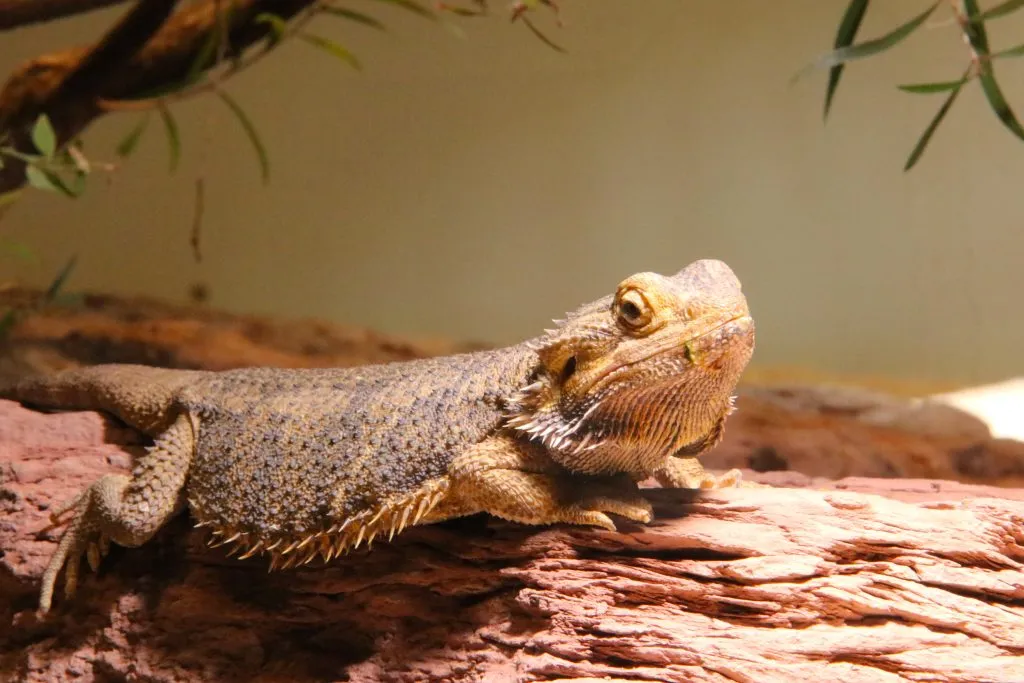
Be it a scrape from a rock structure or a bite from a feeder cricket, an injury can cause your scaled friend to seek solace.
This has a lot to do with their survival instincts. Injured animals often hide until healed to avoid being hunted when weak.
5. Shedding
Shedding may be natural, but it can make your dragon feel testy. When your reptile is undergoing its weekly, monthly, or yearly shed, it can get aggressive because it’s out of its element.
This leads to a fear of being attacked and erratic behavior.
Not to mention, not all sheds are created equal. Sometimes, your pet can undergo a problem in the shedding process, such as stuck skin, making the process even more challenging.
6. Brumation
If you’re not aware of what brumation is, think of it as hibernation for lizards. Bearded dragons seek out warm shelters in the wild when the weather starts cooling.
That’s because their physiological functions slow down as the temperature drops.
Once in a state of brumation, lizards will rest until spring is around the corner and there’s plenty of heat and
If you’re wondering why your bearded dragon is hiding and sleeping, it may be about to brumate. First-time owners can often accidentally cause brumation by allowing the temperatures to drop to the 50 F range.
Tip: If your bearded dragon is showing several disease symptoms, read our article on that here. It can help you saving your bearded dragon!
Behavioral Concerns
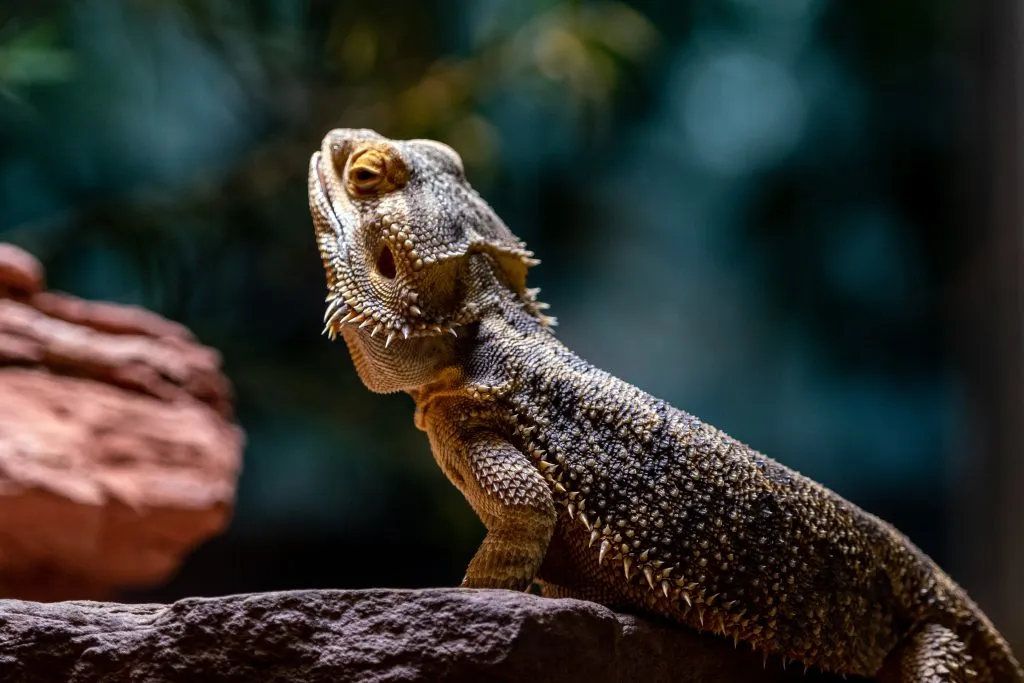
Do you often feel like finding a secluded spot to recuperate when stress levels get too high? You and your dragon may have that in common.
Beardies will often seek hiding spots when something triggers a behavioral change. Here’s how.
1. Stress
Beardies can be surprisingly easy to spook. Be it loud noises, the mating season, or too much handling, bearded dragons can get anxious easily. Whenever things aren’t going your reptile’s way, you can expect it to find a hidey hole.
What makes stress tricky to detect is that several symptoms are similar to those you’d expect in a sick reptile.
These include inappetence, lethargy, beard puffing, etc. Still, it’s vital to identify why your bearded dragon is hiding and not basking. That’s because your pet won’t feel better until you remove the source of stress.
2. Age
While adult beardies generally have no trouble being picked up or handled, hatchlings and juveniles can get jumpy upon contact.
This primarily has to do with a lack of socialization. It’ll take your bearded dragon to get accustomed to your presence and touch, and until then, you can expect plenty of hiding.
3. Boredom
Wouldn’t you feel bored if you were stuck in a room with nothing to do? That’s precisely what bearded dragons can go through when their
Bearded dragons kinda like socializing and exploring, which is why they get along with their pet parents so well.
However, leaving your dragon in a boring
Ambient Factors

Aside from health and behavioral problems, bearded dragons can seek out privacy due to ambient or environmental factors. These can range from troubles within the enclosure to issues outside the
1. Tank Size
There’s a reason experts insist on getting the tank size right when it comes to bearded dragons. Not only do beardies qualify as moderate to large lizards, but as ground-dwellers, they spend most of the time exploring the
Generally, adults require tanks with 55 to 125-gallon capacity, depending on their size. This ensures plenty of room for eating, heating, basking, and hunting.
If your bearded dragon feels cramped, it can get cranky and stressed, which in cause it to seek seclusion to calm down.
2. Inadequate Lighting
More often than not, newbie reptile owners can buy UVB lights that are too bright for their reptile’s eyes. Another standard concern is placing the UVB light too close to the enclosure.
If you notice your bearded dragon hiding from the light or squinting, you need to adjust the lighting accordingly to ensure your dragon isn’t burned or harmed in any way.
3. Heating Issues
Bearded dragons have extended needs when it comes to temperature control. They need a basking area with temperatures ranging from 90 to 100 F, and the cooling spot should be no less than 70 to 80 F.
If you allow temperatures to fall too low, your lizard can get sick, and if the heat is constant 24/7 without a reasonable gradient, overheating can occur.
Either way, your bearded dragon will seek out shelter when the
Tip: We show you the best heat lamps for bearded dragons here!
4. Tank Mates
Beardies may seem all cuddly to you, but they’re pretty territorial and aggressive in their own right. The species are solitary by nature and don’t appreciate company, even during mating season.
If you’ve housed more than one adult bearded dragon in the same
How To Lure Your Bearded Dragon Out Of Hiding
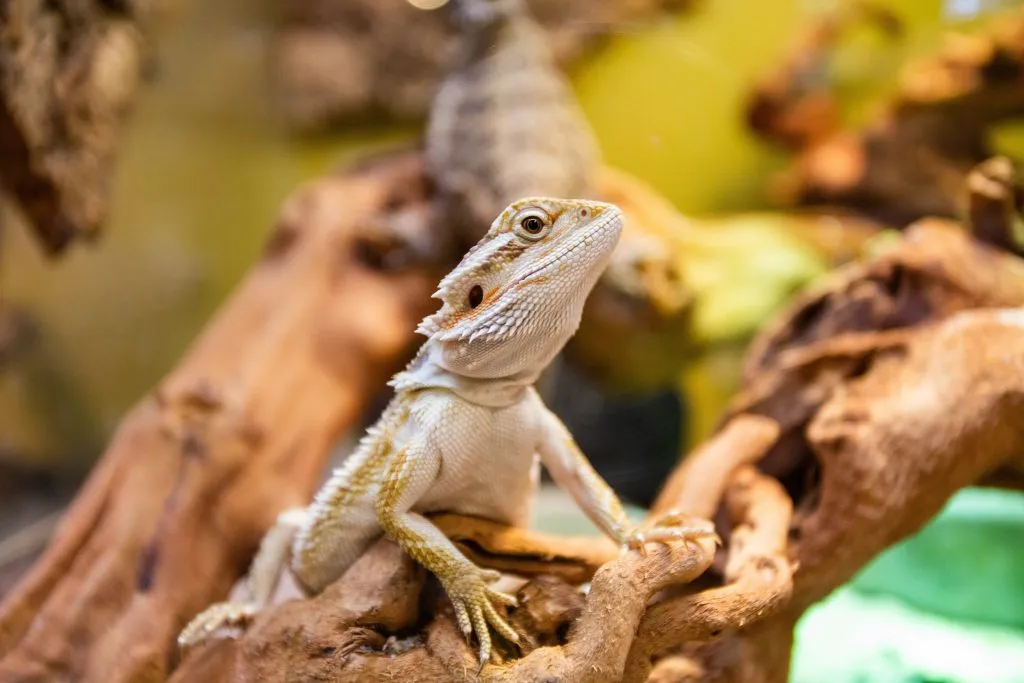
If you’re wondering how to get your bearded dragon to give up on its love for solitude, you must first identify the source of contention.
And, once that’s done, there’s a spate of handy tips below to guide you into luring your dragon out of hiding.
Battling Health Challenges
While injuries, shedding, or brumation leave obvious signs when it comes to digestive or respiratory, and parasitic troubles, you’ll need to watch out for symptoms.
If you have the slightest suspicion your dragon is feeling under the weather (lethargy and inappetence being red flags), it’s best to contact a veterinarian immediately.
Impaction and respiratory infections can develop into life-threatening conditions and shouldn’t be taken lightly.
Besides that, reptile owners can take precautions to ensure such concerns don’t arise. Be careful in your choice of substrates.
While sand isn’t really a bad substrate for beardies, you have to be careful. Beardies tend to eat those substrates if they are deficient in calcium. So always dust feeder insects with calcium powder.
As for avoiding respiratory infections, hygiene, proper heating, and a nutritious diet are essential. It’s also best to ensure that whatever you’re feeding your reptile is small enough to fit in its mouth and not cause digestion problems upon ingestion.
First-time parents facing brumation should avoid handling beardies and let them ride out the process. Brumation can last for a few weeks, and during this time, provide them with fresh water daily and clean the tank regularly.
Shedding bearded dragons should also be left alone to continue the process. Owners can offer beardies warm baths to help the skin shed easily but never attempt to pull off the skin.
Contact your veterinarian to avoid blood flow constriction and other concerns if the skin is stuck.
Taking On Behavioral Concerns
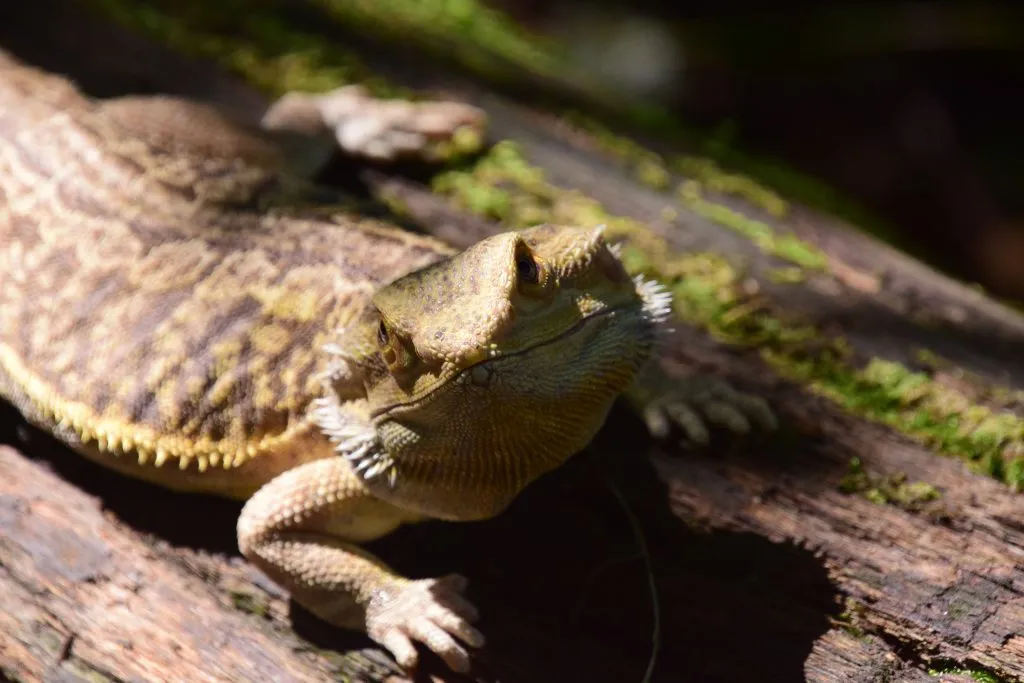
Stress is something bearded dragon parents should always be wary of. Stressed dragons can, at times, appear ill due to sluggishness and poor appetite.
However, other signs can help you distinguish anxiety from health concerns. These include beard puffing and glass surfing.
A sure remedy for stress is tackling the source of anxiety. For example, too much traffic and noise around the
In that case, relocating the
As for age and boredom, these will require different strategies. Young beardies must be socialized slowly over time to lose their shyness. It’s best not to force your dragon to accept your touch; instead, be patient and handle your pet carefully.
You can combat boredom by adding hammocks or caves for your pet to explore. These reptiles will also appreciate being taken out of their enclosures now and again to be petted. Another favorite pastime for beardies is warm baths.
Check your knowledge on Bearded Dragons with the help of our quiz!
Addressing Ambient Factors
If you suspect your bearded dragon is hiding due to environmental factors, addressing the concern should help your reptile go back to normal.
If your pet’s
For heating and lighting problems, always remember that bearded dragons do best with a 20 F gradient between the basking area and the cooling spot.
You may have to try a few temperatures to see which ones your pet likes best. Signs that the basking temperature is to your pet’s liking include bright colors and lounging on the basking spot instead of standing near it.
Ensure you don’t place your lighting too close to the
Finally, bearded dragons like their own company. If you have more than one dragon, it’s best to avoid housing them together to prevent hiding and fights due to their territorial nature.
Again, if your beardie appears to be sick, don’t wait, bring it to a vet asap. If you want to avoid unnecessary trips or don’t live near an exotic vet, book an online vet. For that, we recommend Vetster as they have fantastic, affordable service and offer appointments 24/7. Check out Vetster here!
- Enchi Ball Python: A Unique and Stunning Morph of Python regius - March 27, 2025
- Emerald Tree Monitor: The Enigmatic Green Guardian of the Rainforest - March 26, 2025
- The Egyptian Cobra (Naja haje): A Fascinating Serpent - March 25, 2025
